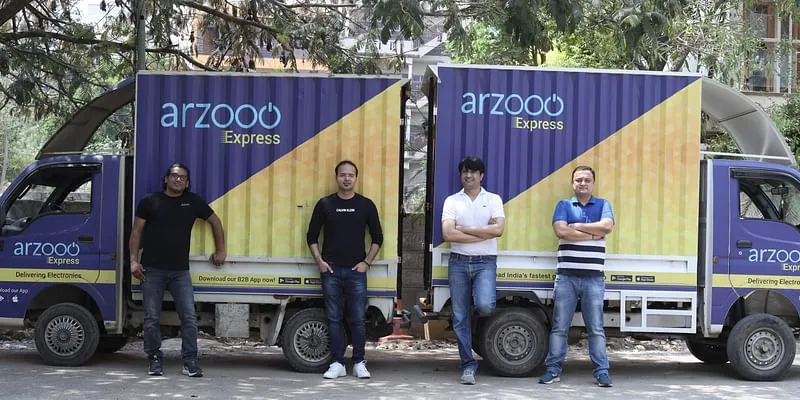This startup founded by two ex-Flipkart colleagues is helping small retail stores to compete with ecommerce giants like Amazon
Arzooo is empowering offline electronic stores by giving them access to competitive prices and their network of logistics, enabling them to drive up sales conversions in-store.
After the emergence of ecommerce platforms, the challenge for offline retailers has been to offer a similarly wide range of products and pricing to their customers.
This problem even gets bigger for the retailers who are in the business of selling large electronic products since they have limited shelf space. Also, the fragmentation of this network puts them at a disadvantage when it comes to sourcing the products at a competitive price.
While working at , and launching and scaling categories for the ecommerce giant, Khushnud Khan realised how crucial are physical stores for customers when it comes to high involvement purchase categories.
“Having worked on and built modern channels like ecommerce, we thought to take the best of ecommerce solutions to offline stores. That was the idea that seeded the concept of Arzooo,” recalls Khushnud Khan, Co-founder and CEO.

Khushnud Khan, CEO and CO-founder, Arzooo
Founded in 2018 with his ex-Flipkart colleague and IIT-Kharagpur alum Rishi Raj Rathore, is empowering offline electronic stores by providing them with a larger selection of consumer products at par with online platforms, and gives them access to better prices, enabling them to drive up sales conversions in-store.
The backstory
A specialist in working with startups, Khushnud used his rich experience in ecommerce and consumer electronics to form partnerships with brands and the retail community.
An ex-Associate Director at Flipkart, he set up and launched its large appliances categories, and as the Head of Marketing and Sales at Datawind Limited, he was involved with launching Akash Tablet at an affordable price of $35.
Headquartered in Bengaluru, Arzooo has 250+ people working across its corporate and regional offices.
Over the last two years, Arzooo has made significant inroads to different geographies across India. With its presence across South, North and East India, over 1,000 high-value consumer electronics stores are registered on Arzooo and powered by its tech platform – Go Store.
Empowering electronic retailers
Arzooo enables partner stores to overcome the broader limitations of physical retail and offer customers a large inventory selection, competitive prices, and fast delivery, without them having to stock up on everything.
“Arzooo’s retail tech platform Go Store equips physical stores with 5X bigger selection,” claims Khushnud in a conversation with YourStory.
To further help retailers, Arzooo launched ‘retail-from-home’ solution in April 2020 to enable retailers to reach out to customers and sell consumer durables even as their stores remain temporarily closed in the wake of the COVID-19 pandemic.
How does it work?
Arzooo benefits stores to purchase electronics at the best price and equips them with 10X variety of products without having to invest in inventory.
Using the Arzooo app, the retailer can browse through a range of products and even share them with customers through social media channels like WhatsApp, Facebook, and Instagram. Apart from this, retailers can also set their own retail price, however, Arzooo supplies the product to the retailers at the B2B price already mentioned in the app.
After receiving the response from the customers, retailers can send them a payment link from the Arzooo app. The customer is free to make the payment through credit card, debit card, netbanking, UPI, etc.
And once the customer makes the payment, the retailer will get an SMS confirmation of the payment, and the confirmation is also sent to Arzooo.
The startup will then deliver the product from the retailer's warehouse to the customer, and transfer the payment received from the customer to the retailer.

Arzooo Express
In case the retailer doesn't have the product in the store, they can inform Arzooo, and the startup will ship the product directly to the customer on the retailer’s behalf, and transfer the retailer its retail margin upon receiving the invoice.
Besides putting each offline stores in the same league as Flipkart and Amazon when it comes to selection and pricing, Arzooo equips its partner stores with fast delivery via Arzooo Express, its in-house logistics service in which the retail-tech startup recently invested $2 million, and attractive financing solutions via Arzooo Credits.
Arzooo Express, besides having a fleet of vehicles plying around cities, has an end-to-end technology platform to manage Arzooo’s supply chain on a real-time basis. In first phase, Arzooo Express will be serving 10,000 pin codes across the country with a fleet of 70 trucks.
“We also ensure retailers can operate their business with limited working capital and run an asset-light business to save costs and spin profits,” Khushnad says.
Business model
Around 10,000+ retail stores spread across 18 states are registered with Arzooo. The startup buys the products from the respective brands and supply partners, and then ships them to its partner stores using Arzooo Express – its own logistics infrastructure.
“We don’t charge any fee for the platform at any point, making the technology adoption free for our partner retailers,” he says, adding, “Arzooo makes its margin from the difference between the buying price and the price it sells to its partner stores. This is what we refer to it as our gross margin.”

Image Credits: YS Design Team
The startup claims to be clocking an annual gross merchandise volume (GMV) sales of over $120 million.
Arzooo raised about $15 million worth of capital in the last two years, including Series A raise of $7.5 million led by WRVI Capital along with its existing investors in October 2020, followed by $6 million in February 2021 by Trifecta Capital.
Also in November 2020, Arzooo raised an undisclosed amount from Zoom Video Founder Eric Yuan, along with Silicon Valley venture capitalist Bill Tai. This was Eric's first investment in India.
COVID-19’s impact
Speaking about the pandemic’s impact, Khushnud says that though the global health crisis has been devastating, some positive changes have been worth noting. The organic adoption of the platform has risen 5X at a time when offline businesses slowed down.
They also did some tech innovation by launching an all-digital credit facility – Arzooo Credit – to uphold retail partners. Arzooo Credit is a digital lending solution that gives retailers the immediate working capital needed to handle slump or seasonal spikes.
Speaking about the development, Khushnud Khan says,
“Credit is integral to retail more so with small and medium retail business, our vision of powering retail with technology necessitates bringing access to seamless credit solutions to retailers which is necessary for them to grow their business. Arzooo Credit is a significant step forward in creating a working capital headroom that will help store owners conduct their business seamlessly.”
Arzooo Credit is one of the options for making transactions on the Arzooo Go Store. The B2B platform is available on both Android and iOS platforms.
Market and future plans
India’s retail sector contributes over 50 percent to the national GDP, with the offline electronic retail market valuing over $64 billion, according to the GfK report. It was one of the worst-affected sectors during the coronavirus-induced lockdown last year, directly hurting the livelihood of millions of retail entrepreneurs, blue-collar workers, and their dependents.
The B2B retail-tech platform aims to empower 50,000 small and medium retail stores across India by the end of 2021, and additionally, expects to expand its operations in western India, focusing on Maharashtra and Gujarat.
“Besides footprint expansion, we are constantly scaling our tech platforms with the acquired learning and scaling the speed and quality of service,” mentions Khushnad.
“In India, we do not have any direct competitors. Our moat strategy is based on creating end consumer-focused solutions while working with B2B partners and helping them stay competitive against their online peers,” concludes Khushnud.
Edited by Kanishk Singh






![[Funding alert] Zoom's Eric Yuan and VC Bill Tai invest in B2B retail tech startup Arzooo](https://images.yourstory.com/cs/2/e641e900925711e9926177f451727da9/Imagefajy-1603787800570.jpg?fm=png&auto=format&h=100&w=100&crop=entropy&fit=crop)
![[Funding alert] Ex-Flipkart execs' Arzooo.com raises $1M in Pre Series A](https://images.yourstory.com/cs/2/3fb20ae0-2dc9-11e9-af58-c17e6cc3d915/arzooo1560419881539.png?fm=png&auto=format&h=100&w=100&crop=entropy&fit=crop)